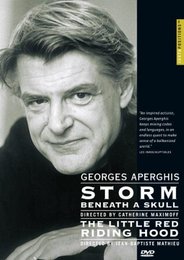| All Artists: Aperghis, Ensemble Reflex Title: Aperghis: Storm Beneath a Skull Members Wishing: 1 Total Copies: 0 Label: Juxtapositions Release Date: 12/5/2006 Album Type: Classical, Color, Dolby, DVD, NTSC Genre: Classical Styles: Historical Periods, Classical (c.1770-1830) Number of Discs: 1 SwapaCD Credits: 1 UPC: 899132000183 |
Search - Aperghis, Ensemble Reflex :: Aperghis: Storm Beneath a Skull
CD Details |
CD ReviewsWhat it means to be human through the voice scarecrow | Chicago, Illinois United States | 03/18/2008 (5 out of 5 stars) "Few post-war creators have understood the voice as Aperghis, who has been writing for the human voice his entire life, and knows how to merely set a situation,give it, leen on it without enough tension;never overdetermining it like an unaccompanied solo, where the performer can take over,jump into the waters of human emotion; he does not overarticulate his music, its content is like an emotional shell,where the human sensibility can be exposed, it is the performer who explores it, and really has an advantage over the listener, for Aperghis teaching the performer more about him or herself;his vocal works do not have impeccable performative detail, he leaves those dimension to the performers to explore. A Solo piece like "Recitations"(1977-78) is the place to begin,one person, one voice, high-middle-low timbres; rhythm and timbre is whatever can be produced by the human voice;wordless texts, cliks, pings, aspirations,airy gutturals,breaths of anger and fear, anxiety of glissandi, silences are important as well;Aperghis agenda has been vast engaging heavy hitters as Heiner Mueller as well; you begin here to see what is possible first, prior to reconvening with another work; a vocal duet, even the introduction of a tabla drum as a piece here is fascinating and powerful.What is accompaniment becomes a fascinating question; for all sounds here are required.
The performers (who are also interviewed) speak well about what they do to prepare an Aperghis work, how the piece draws down deeply within all dimensions of psychology, of what the human voice and the inflections can come to mean. He also relates much of how he works in an (interspersed interview )here.(Paraphrasing) "It is all there I suspect, you just need to find it" as a composer, as a performer. Lacan would say this as well, there are no mysteries within the human space,you just need to find them, to travel with Alice into the tea party;That is a fascinating way to think about creativity and composition, certainly leave behind from the post-war paradigm of high modernity,or the top-down tyranny, the philosophical elitism that puts the listener in an alienated state via 'complexity' with the performer. Aperghis is really trying to make us discover what we should know about ourselves,and come to discover oursleves in some way that perhaps may make our own pathologies easier to comprehend and deal with everyday. The pieces here you cannot say are "textless" simply that the content of words,(fragments) what they may suggest and imply is less important than what the perfomer does with these suggestions. Aperghis work is simultaneously playful, that we are simply human,some reference to Shakespeare is in order, where vocal timbre was also important,or Samuel Beckett; perhaps not as much as Apeghis, but Elizabethan drama regarded the volcanic eruption of words as the focus, where every particle of reality and un-reality is spoken.Beckett as well regarded how words are said as just as important as the content of it;Aperghis fairly works at this level minus the impactedness of words, words are merely triggers for rhythmis sound,not encompassing large registral ranges either;fairly within the speaking human voice;, his rhythms are fairly straight-forward, playful again as in "Recitations" where graphic musical notation is utilized with abundant uses of canons, and rounds, "ring 'round the rosie", additive processes where each declamation adds one more word in a fast "tres vif" tempo. There is also a wonderful piece for two pianos herein "Alter Face", like a glass chandelier, where the tickles gently tingle at each other's timbre. Lastly there is a 'revistation' of "little red riding hood", in a post-modern content,one scene,no props; where "Red" is simply portrayed by whomever is wearing a red-stocking cap, or red bandana. The forces here are utilized quite well where musicians are the actors, the wolf represented by two 'walking'lumbering bass clarinetists, (one walking backwards against the back of the other),both donned with wolf-masks.The wolf then is represented variously bu whomever is wearing a wolf-mask, a double, quadruple entendre.Also this is consistent with other aspects; There is an upright piano that sometimes is played upon while text is either sung or recited,but sometimes piano sounds emanates from backstage, where the onstage piano (sitting motionless) becomes "Other", this third person dimension is also represented in the Tuba, merely laying on the floor of the stage to the piano's left,(our right) played through a long tube from off-stage. You get wonderful duets, solos, trios, and quartets in this children's representations,you seem never to know where "evil" may lurk,perhaps that is the point here; 'evil' is all around us everyday in 'objects' and 'personas' we mingle with,make 'love' to,speak and 'work' with everyday; the 'performance' is impeccable." |

